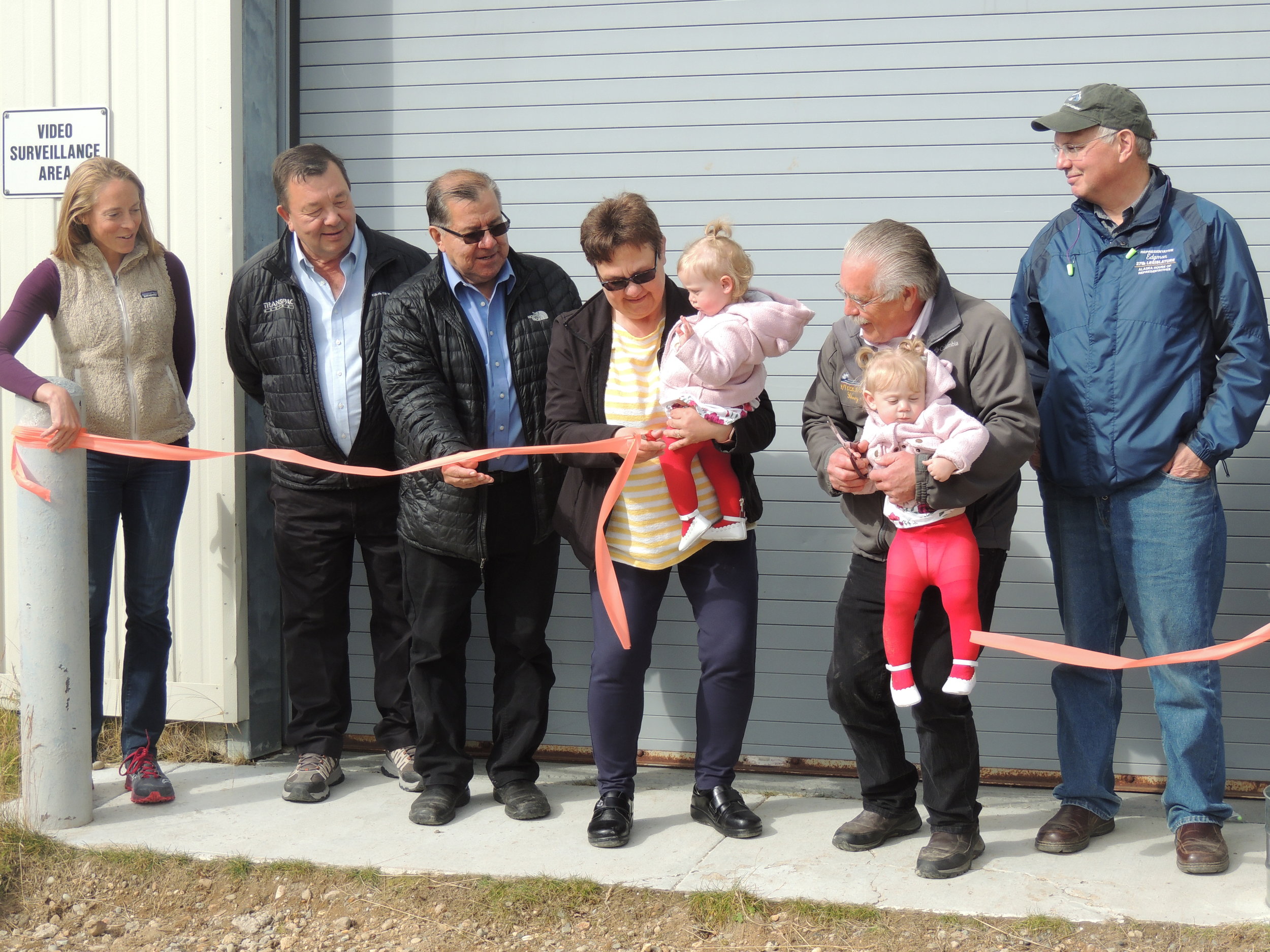State, Local Officials Celebrate Success of Waterfall Creek, King Cove’s Second Hydroelectric Facility, during Dedication Ceremony
From left to right: Katie Conway, Government Relations Director for the Alaska Energy Authority (AEA); Alvin Osterback, Aleutians East Borough Mayor; Alaska Senator Lyman Hoffman; Marilyn Mack, wife of King Cove Mayor Henry Mack; King Cove Mayor Henry Mack; and Alaska Rep. Bryce Edgmon. (Henry and Marilyn Mack are holding their granddaughters, Khloe and Kambria). Photo provided by Aleutians East Borough.
by Aleutians East Borough
Several state and local officials traveled to King Cove to participate in the city’s dedication and ribbon cutting ceremony of Waterfall Creek, the community’s second hydroelectric facility. Since Waterfall Creek began operating in May 2017, it has produced more than 1.3 MW (megawatts) of energy and has performed remarkably well.
“We are very proud that since 1994, King Cove has been the most remote, productive micro-grid renewable energy community in Alaska,” said King Cove Mayor Henry Mack.
State and local officials who flew to King Cove for the city’s dedication ceremony included: Alaska Senator Lyman Hoffman; Rep. Bryce Edgmon; Barbara Blake, Senior Advisor to Governor Walker; and Aleutians East Borough Mayor Alvin Osterback. The group visited the city’s waterfront, school, new diesel plant, and the new Waterfall Creek hydro facility in addition to the Delta Creek hydro facility.
Alaska Sen. Lyman Hoffman and his wife, Lillian Hoffman, christening the new hydro project with a bottle of champagne. Alaska Sen. Lyman Hoffman and his wife, Lillian Hoffman, christening the new hydro project with a bottle of champagne. Photo provided by Aleutians East Borough.
“What it means to King Cove is they’re moving toward electric energy independence, which is a goal I wish all Alaskans could have,” said Alaska Senator Lyman Hoffman.
“This project is a role model for other communities because every community aspires, to some extent, to have renewable energy,” said Rep. Bryce Edgmon. “I see places like King Cove, Kodiak and Cordova leading the way.”
City employees unveiling the new sign at the facility for Waterfall Creek Hydroelectric Facility. Photo provided by Aleutians East Borough.
Waterfall Creek is the community’s second run-of-the river facility. Delta Creek, the city’s first hydro facility, went online in 1994 and is about twice the size of Waterfall Creek. For the past 24 years, Delta Creek has produced more than 50% of the community’s annual energy demand. Combined, these two renewable energy sources have increased the city’s annual energy production to 80% of the city’s annual power demand of 4.5 megawatts.
“Our hydro facilities have displaced 3.2 million gallons of diesel during the past two and a half decades,” said Mayor Mack. “That’s about $5.8 million in cost savings. Our carbon footprint is much smaller as a result, which is quite an accomplishment.”
“I think the more the Borough and the communities invest in renewable energy, in the long run, it’s going to be best for all the communities,” said Aleutians East Borough Mayor Alvin Osterback.
King Cove’s current cost of a kilowatt hour (kWh) of electricity is 30 cents. This cost is one of the least expensive throughout rural Alaska, which has an average cost of 45 cents/kWh.
“We are very happy that the city, residents and businesses are saving money from this renewable energy source,” Mayor Mack said. “Delta Creek, our first hydro facility, has been saving King Cove residents and local businesses about $1,000 per year in energy costs.”
The Waterfall Creek hydro project took about ten years to complete, from the initial concept, design, permitting, funding and construction. The project cost $6.52 million. It was funded with $3.58 million in grants/funding: $2.8 million from the Alaska Energy Authority; $500,000 from the Aleutians East Borough; $240,000 from the City of King Cove; and $41,000 from HDR. Long-term debt of $2.94 million was also used to finance the project, which includes $1.51 million from the Alaska Municipal Bond Bank and $1.43 million from the State Power Project Fund.
The community of King Cove, located on the south side of the Alaska Peninsula, was settled in 1911. It incorporated as a city in 1949. Currently, the population is 950. King Cove is the second largest city in the Aleutians East Borough. The progressive community’s economy depends on commercial fishing and seafood processing. The largest wild salmon cannery operations in Alaska is located in King Cove. For more information about King Cove, visit the Aleutians East Borough website.
The sign unveiled. Photo provided by Aleutians East Borough.
Articles about King Cove
Published September 2018


